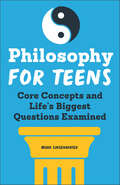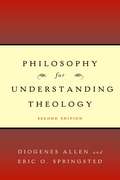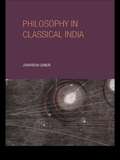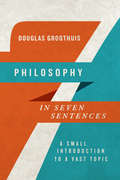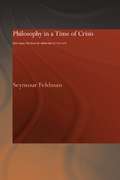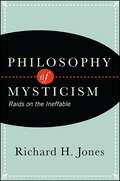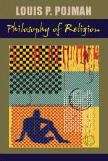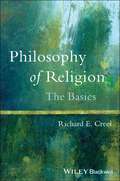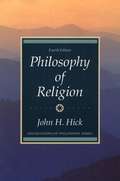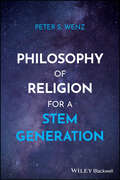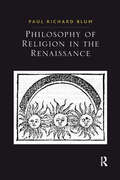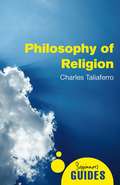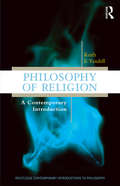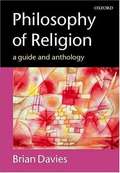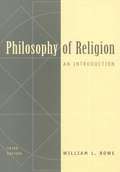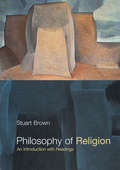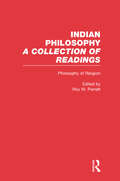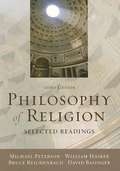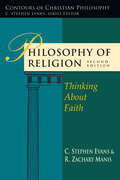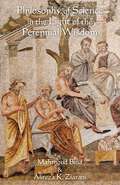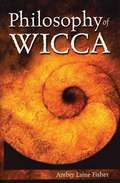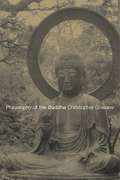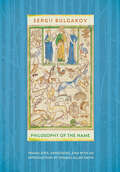- Table View
- List View
Philosophy for Teens: Core Concepts and Life's Biggest Questions Examined
by Mark LinsenmayerExplore philosophy through thought-provoking questions for teens If you like to ask deep questions about the world around you, then you already think like a philosopher. This book presents philosophy through fascinating questions you may have already thought about, like: Can we prove the existence of a God? What are minds, really? How can we be sure about anything? Ponder all these ideas and many more as you learn core philosophy concepts and strengthen your critical thinking skills.What sets this book about philosophy for kids ages 12 to 16 apart:An introduction to philosophy—Discover the history of philosophy, what makes a question philosophical in nature, and how being a philosopher can benefit you.The six main branches—Find questions organized by their branch of philosophy: metaphysics, epistemology, ethics, logic, aesthetics, and political philosophy.Philosophy in practice—Learn which philosophers asked and answered each question, explore different sides of an argument, and apply philosophical concepts to real life.Ponder life's biggest questions with this teen-friendly choice in philosophy books.
Philosophy for Understanding Theology, Second Edition
by Diogenes Allen Eric O. SpringstedThis new edition of Philosophy for Understanding Theology adds chapters on postmodernism and questions of the self and the good to bring the book up to date with current scholarship. It introduces students to the influence that key philosophers and philosophical movement through the centuries have had on shaping Christian theology in both its understandings and forms of expression
Philosophy in Classical India: An Introduction and Analysis
by Jonardon GaneriThis original work focuses on the rational principles of Indian philosophical theory, rather than the mysticism more usually associated with it. Ganeri explores the philosophical projects of a number of major Indian philosophers and looks into the methods of rational inquiry deployed within these projects. In so doing, he illuminates a network of mutual reference, criticism, influence and response, in which reason is used to call itself into question. This fresh perspective on classical Indian thought unravels new philosophical paradigms, and points towards new applications for the concept of reason.
Philosophy in Seven Sentences: A Small Introduction to a Vast Topic (Introductions in Seven Sentences)
by Douglas GroothuisSocrates—The unexamined life is not worth living.Augustine—You have made us for yourself, and our hearts are restless until they rest in you.Descartes—I think, therefore I am.Pascal—The heart has reasons, that reason knows nothing of.
Philosophy in a Time of Crisis: Don Isaac Abravanel: Defender of the Faith (Routledge Jewish Studies Series)
by Seymour FeldmanThe expulsion from Spain did not only result in the destruction and dispersion of Spanish Jewry but led to a crisis in Jewish faith. Don Isaac Abravanel provided a systematic treatment of the main philosophical and theological beliefs of Judaism in an attempt to resolve the inner doubts of his co-religionists. In their Italian exile his son Judah too recognized that Jews were now living in a new cultural world, but he forged a different road for Jews to pursue in their entry into the culture of the Renaissance. This book presents a picture of one family facing the challenges of a new era in Jewish history.
Philosophy of Mysticism: Raids on the Ineffable
by Richard H. JonesThis work is a comprehensive study of the philosophical issues raised by mysticism. Mystics claim to experience reality in a way not available in normal life, a claim which makes this phenomenon interesting from a philosophical perspective. Richard H. Jones's inquiry focuses on the skeleton of beliefs and values of mysticism: knowledge claims made about the nature of reality and of human beings; value claims about what is significant and what is ethical; and mystical goals and ways of life. Jones engages language, epistemology, metaphysics, science, and the philosophy of mind. Methodological issues in the study of mysticism are also addressed. Examples of mystical experience are drawn chiefly from Buddhism and Advaita Vedanta, but also from Christianity, Judaism, Islam, and Daoism.
Philosophy of Religion
by John CottinghamReligious belief is not just about abstract intellectual argument; it also impinges on all aspects of human life. John Cottingham's Philosophy of Religion opens up fresh perspectives on the philosophy of religion, arguing that the detached neutrality of much of contemporary philosophizing may be counterproductive - hardening us against the receptivity required for certain kinds of important evidence to become salient. This book covers all the traditional areas of the subject, including the meaning of religious claims, the existence of God and the relation between religion and morality, as well as the role of spiritual praxis and how religious belief affects questions about the meaning of life, human suffering and mortality. While preserving the clarity and rigor that are rightly prized in the analytic tradition, the book also draws on insights from literary and other sources, and aims to engage a wide readership.
Philosophy of Religion
by Louis J. PojmanThe author's goal in writing this book in philosophy of religion is to produce a text which is analytically rigorous, accessible to students, and balanced in presentation and which covers the major issues, ranging from the traditional arguments for and against the existence of God through personal identity and immortality to the questions of the relationship between faith and reason and the relationship between morality and religion.
Philosophy of Religion
by Richard E. CreelPhilosophy of Religion: The Basics offers a concise introduction to philosophy of religion, distilling key discussions and concepts of the subject to their succinct essence, providing a truly accessible entry into the subject.A truly accessible introduction to philosophy of religion for beginnersTakes a topical approach, starting with the nature of religion and moving the reader through the major concepts, explaining how topics connect and point to one anotherOffers a thorough and full treatment of diverse conceptions of God, the ontological argument, and divine attributes and dilemmasA genuinely concise introduction, this text can be used alongside other resources without overtaxing studentsRepresents 30 years of experience teaching to undergraduatesIncludes a free downloadable file with key excerpts and additions to help students study
Philosophy of Religion (4th Edition)
by John H. HickRevision features an updated discussion on the main topics in the philosophy of religion: the concept of God - grounds for belief in God - ground for disbelief in God - the problem of evil - revelation and faith - problems of religious language - the conflicting falsifiability of religious assertions - the conflicting truth-claims of different religions - human destiny and more.
Philosophy of Religion for a STEM Generation
by Peter S. WenzA Fresh and Engaging Introduction to Philosophy of Religion for STEM Students Philosophy of Religion for a STEM Generation applies a new cross-disciplinary approach to the age-old questions of religion and science. Written by philosopher and educator Peter S. Wenz, this innovative textbook combines the rigor of scientific reasoning with the depth of theological inquiry, creating a unique bridge between STEM students and philosophy of religion. Using humor, pop culture, and personal narratives, Wenz considers philosophical questions surrounding the existence of God, the nature of the universe, free will, the problem of evil, and other key philosophical arguments. Fully integrating scientific theories and methods into discussions of traditional religious topics, the book not only considers the scientific worldview but also examines how science and theology can complement one another. Student-friendly chapters offer fascinating insights into how philosophical analysis and scientific evidence can converge while providing a balanced examination that makes complex ideas relatable and thought-provoking, without taking a stance on whether or not God actually exists. Philosophy of Religion for a STEM Generation is ideal for students in undergraduate Philosophy of Religion or Philosophy of Science courses, as well as all students seeking to understand religion’s role in a scientific world and explore life’s biggest questions at the intersection of science, faith, and philosophy.
Philosophy of Religion in the Renaissance
by Paul Richard BlumThe Philosophy of Religion is one result of the Early Modern Reformation movements, as competing theologies purported truth claims which were equal in strength and different in contents. Renaissance thought, from Humanism through philosophy of nature, contributed to the origin of the modern concepts of God. This book explores the continuity of philosophy of religion from late medieval thinkers through humanists to late Renaissance philosophers, explaining the growth of the tensions between the philosophical and theological views. Covering the work of Renaissance authors, including Lull, Salutati, Raimundus Sabundus, Plethon, Cusanus, Valla, Ficino, Pico, Bruno, Suárez, and Campanella, this book offers an important understanding of the current philosophy/religion and faith/reason debates and fills the gap between medieval and early modern philosophy and theology.
Philosophy of Religion: A Beginner's Guide (Beginner's Guides #3)
by Charles TaliaferroWhy does evil exist? Could God could create a stone he couldn't lift? Does the wonder of life imply a creator? Philosophy of religion is concerned with such questions. Assuming no prior knowledge of philosophy, Taliaferro provides a clear exploration of the discipline, covering the key topics of morality and religion, evil, the afterlife, prayer, and miracles. Also containing a section dedicated to Hinduism, Buddhism and the Eastern religions, this helpful primer is the perfect resource for students or the general reader. Charles Taliaferro is Professor of Philosophy at St. Olaf College, Minnesota, USA. He is the author or editor of numerous books on the philosophy of religion including as co-editor of The Blackwell Companion to Philosophy of Religion.
Philosophy of Religion: A Contemporary Introduction (Routledge Contemporary Introductions to Philosophy)
by Keith E. YandellKeith Yandell's Philosophy of Religion: A Contemporary Introduction was one of the first textbooks to explore the philosophy of religion with reference to religions other than Christianity.?This new, revised edition explores the logical validity and truth claims of several world religions—Christianity, Judaism, Islam, Hinduism, Buddhism, and Jainism—with updated, streamlined discussions on important topics in philosophy of religion such as: Religious pluralism Freedom and responsibility Evidentialist Moral Theism Reformed Epistemology Doxastic Practice Epistemology The problem of evil Ontological and cosmological arguments Other new features include updated Questions for Reflection,and new Annotated Bibliographies for each chapter, as well as an updated Glossary. This exciting new edition, much like its classic predecessor, is sure to be a classroom staple for undergraduate students studying philosophy of religion, as well as a comprehensive introductory read for anyone interested in the subject.
Philosophy of Religion: A Guide and Anthology
by Brian DaviesPhilosophy of Religion: A Guide and Anthology provides a comprehensive, authoritative, and accessible overview of the philosophy of religion. Under the careful editorship of Brian Davies, the book contains a selection of the best classical and contemporary writings on the philosophy of religion together with substantial commentary, introductory material, discussion questions, and detailed guides to further reading. The editorial material sets the extracts in context and guides the readerthrough them. Taken as a whole, the book offers the ideal, self-contained introduction to the questions which have most preoccupied Western philosophers when thinking about religion. The selection is both very comprehensive and very generous. 65 sizeable extracts map out the full range of topics most commonly encountered in courses on the philosophy of religion. Part I looks at the relation between philosophy and religious belief; Parts II-IV consider the existence and nature of God; Part Vaddresses the 'problem of evil'; and Parts VI and VII are devoted to the relationship between morality and religion and to the question of life after death.
Philosophy of Religion: An Introduction
by William L. RoweThird Edition: It is reasonably clear that the arguments for the existence of God will continue to receive serious attention.
Philosophy of Religion: An Introduction with Readings (Philosophy and the Human Situation)
by Stuart BrownWith the entry-level student in mind, Stuart Brown guides the reader through three main topics: whether or not there is life after death; whether or not there is a powerful, beneficent intelligence controlling the universe; and the nature and appropriate defence of religious belief or faith. Each chapter is linked to readings by commentators on religion and belief, such as David Hume, John Hick, Richard Dawkins and William James. Key features also include activities and exercises, chapter summaries and guides to further reading.
Philosophy of Religion: Indian Philosophy (Indian Philosophy Ser. #Vol. 4)
by Roy W. PerrettFirst Published in 2001. Routledge is an imprint of Taylor & Francis, an informa company.
Philosophy of Religion: Selected Readings
by William Hasker Michael Peterson Bruce Reichenbach David BasingerThe new edition of this perennially popular anthology in the philosophy of religion examines both basic classical concepts and a host of contemporary issues. Organized into fourteen thematic sections, Philosophy of Religion presents seventy-three selections that cover standard subjects--religious experience, theistic arguments, the problem of evil, and miracles--as well as more recent topics including reformed epistemology, process theism, the kalam theological argument, the religion-science controversy, religious ethics, and the diversity of world religions. The third edition adds two new sections--on the ontological status of religion and open theism--along with helpful study questions and a glossary. It also features revised and expanded section introductions and updated suggestions for further reading. While it deals primarily with the Western and analytic traditions in philosophy, Philosophy of Religion, Third Edition, also incorporates readings representing continental, feminist, and Asian perspectives. New selections include essays by Marilyn McCord Adams, Robert Merrihew Adams, David Basinger, Emile Durkheim, C. Stephen Evans, J. R. Lucas, Bruce Reichenbach, and Jean-Paul Sartre. An ideal stand-alone textbook for courses in the philosophy of religion, this volume is also readily compatible for use as a primary source reader in conjunction with a secondary text.
Philosophy of Religion: Thinking About Faith (Contours of Christian Philosophy)
by C. Stephen Evans R. Zachary ManisAdd this ebook to your cart, purchase it and download it immediately in any or all of these formats: PDF.Philosophy of Religion
Philosophy of Science in the Light of the Perennial Wisdom
by Mahmoud Bina Alireza K. ZiaraniBacked by its technological achievements, modern science appears as the de facto source of truth to the majority of our contemporaries. Its sole reliance on reason and empirical data gives it an air of objectivity that has conferred upon it an almost unquestioning authority. Against the backdrop of this pervasive scientism, Philosophy of Science in the Light of the Perennial Wisdom is a daring attempt to offer an intellectual critique of modern science in its foundation by rigorously examining the intrinsic limitations of rational thought and empirical investigation. Unique of its kind, this book offers a refreshing look at the traditional doctrines of epistemology and metaphysics as an antidote to the subjective as well as objective errors of modern science, which is thus revealed as no more than a belief system that falls radically short of offering a full knowledge of reality; this, in contrast to the perennial wisdom of the world's great religions that for millennia have offered humankind not only keys to true knowledge, but also the means of attaining it, which precisely constitutes man's reason for being.
Philosophy of Wicca
by Amber Laine FisherThis book examines and analyzes the philosophy of Wicca, and among other things discusses how Wiccans can interact with mainstream religions. Other topics include why nature is important in Wicca, an examination of the Wiccan Rede and why balance is so important in the practice of Wicca.
Philosophy of the Buddha: An Introduction
by Christopher GowansPhilosophy of the Buddha is a philosophical introduction to the teaching of the Buddha. It carefully guides readers through the basic ideas and practices of the Buddha, including kamma (karma), rebirth, the not-self doctrine, the Four Noble Truths, the Eightfold Path, ethics, meditation, non-attachment, and Nibbâna (Nirvana).The book includes an account of the life of the Buddha as well as comparisons of his teaching with practical and theoretical aspects of some Western philosophical outlooks, both ancient and modern. Most distinctively, Philosophy of the Buddha explores how Buddhist enlightenment could enable us to overcome suffering in our lives and reach our full potential for compassion and tranquillity.This is one of the first books to introduce the philosophy of the Buddha to students of Western philosophy. Christopher W. Gowans' style is exceptionally clear and appropriate for anyone looking for a comprehensive introduction to this growing area of interest.
Philosophy of the Name (NIU Series in Orthodox Christian Studies)
by Sergii BulgakovThis is the first English translation, by Thomas Allan Smith, of Philosophy of the Name (Filosofiia imeni). Sergii Bulgakov (1871–1944) wrote the book in response to a theological controversy that erupted in Russia just before the outbreak of World War I. Bulgakov develops a philosophy of language that aims to justify the truthfulness of the statement "the Name of God is God himself," a claim provoking debate on the meaning of names, and the Name of God in particular. Philosophy of the Name investigates the nature of words and human language, considers grammar and parts of speech, and concludes with an exposition on the Name of God.Name-glorifying, a spiritual movement connected with the Orthodox practice of the Jesus Prayer, was initially censured by the Holy Synod of the Russian Orthodox Church, and the controversy raised profound questions that continue to vex ecclesiastical authorities and theologians today. The controversy exposed a vital question concerning the ability of human language to express experiences of the Divine truthfully and authentically. Bulgakov examines the idea that humans do not create words, rather, objects speak their word to human beings, and words are the incarnation of thought in a sonic body conveying meaning.Philosophy of the Name offers a philosophy of language for contemporary theologians of all confessions who wrestle with the issue of language and God. It is a persuasive apologia for the mysterious power of words and an appeal to make use of words responsibly not only when speaking about God but equally when communicating with others.
Philosophy of the State as Educator
by Fr. Thomas DubayPenetrating analysis of questions like: What is the function of the state in education? What obligations does the state have to support private education? Must the state teach morality?
